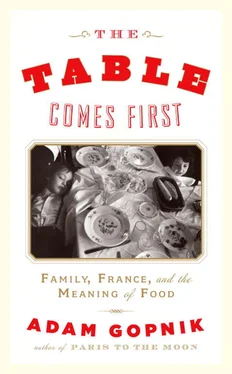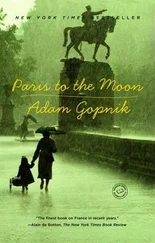That night, back in Paris, none of us were really hungry—I can’t eat more than one real French meal a day, who can?—but by ten-thirty or so, still bright in the Palais Royal, where we were, luckily, blessedly, staying in a friend’s beautiful apartment, I did a quick dish of spicy rice and beans, a dish that the children love, and that Martha and I associate with one of the worst nights of our life, and then with its happy ending—a night when Luke was desperately sick with what turned out to be salmonella, food poisoning, and we had carried him to Necker, the children’s hospital, and they had made the diagnosis and had prescribed drugs for it. We had gotten him home—I had raced to an all-night pharmacy on Montparnasse, I think it was, and then given it to him and—miracle!—he seemed almost instantly better. We tucked him in, and, after a day’s pain, we realized suddenly that we were hungry. And I made rice and spicy beans, and we were happy.

I looked out on the beautiful placid gardens, where the great comic adventure of the restaurant had begun two centuries before, when Chantoiseau had opened his little bouillon parlor and Brillat-Savarin had praised it, and where so many pilgrims had come since to have dinner and find love, or something.
What is it that we want from eating? Comfort? Absolutely. A symbol of love shared? For sure. But above all, food matters for us as a daily symbol of the sacred, which means for secular people that it is a kind of sacred-in-itself. Questions of food are all just questions of living refracted outward, like the imaginary mountains explorers see in the Arctic, projections forward of their own ice-breaking boats. The plate of rice and beans, the dumbest thing I do, is also the most blessed, since it sums up in a single spicy point a whole story of our lives, and the intersection of others. We can have our cake and eat it, too, if we are willing to see that the point of having cake is to eat it and accept that then it will be gone. The secret of life is detachment and attachment in equal measure, the cake devoured but still held in our mind.
We are, after all, animals who experience our lives as if we were gods. We eat, burp, grow, shit. And yet we construct from the brutal sensory necessities a shape and a history and a purpose to life; we sit down and choose from the menu. The truth is that we have a hard time treating cooking as an art because it is so easy for us to experience it as a miracle. Dinner is often our brush with Olympus. The gods sat down to dinner twice a day, even though they would live forever if they never ate again.
We eat like animals and dine like… well, like demigods at least, minor local deities of minor local shrines. And we have a tragic dimension dignified enough for deities, too, since our animal nature assures that we will not be animals forever. Our knowledge of mortality is the overwhelming fact of our life. We seek for some kind of comfort and escape from that terror, and none is better than the apparent continuities and the small miracle of eating: you always do this. You were starving, and now you’re not. In the most beautiful of psalms, the shadow of death, whose valley we all walk through, is met by a spread table. It isn’t an accident that Jesus’ most original act was at a table, too, which seemed so shocking to a peasant honor society, where values depended on clean and unclean. Jesus would eat with anybody , whores and tax collectors, Gentiles and tribesmen. What did he eat? We can’t be sure, but we know he liked wine enough to make a lot. He ate what he liked where he liked with whom he liked, at a table open to all.
That was what Decour had really meant, I think, by “questions of food” in his letter, and that was why he thought of them at the very end: it was the closest he could come, as close as he needed to come, to an idea of the sacred. We have trouble thinking that food is art, but no trouble at all imagining that it might be divine. We doubt that Ferran Adrià is as good as Picasso, but accept that wine might be made the blood of God. Our difficulty with the idea of food as a fine art is not that we have trouble elevating it that high; it is that we have difficulty in making it descend that low. We may not share the particular sacredness of the particular table—but no one has any difficulty with the concept: water into wine and wine into blood? Oh, yes, I get that. Saffron rice and honey and you become a man? How else? What you eat is how you please omniscient power? It’s obvious, isn’t it? There are many metaphysical ideas that bewilder even the metaphysicians; the idea that food is the material of faith is not one of them.
Cooking is the faith that raw ingredients can be conjured into a nightly miracle. The oldest of all recorded stories is the story of Enkidu from the epic of Gilgamesh, and it is a story of the divine power of food and sex and wine to make us human. Enkidu, a kind of wild, uncivilized ape-man, is saved by a prostitute, a member of the oldest profession, or priesthood. “Nothing does Enkidu know of eating bread / and to drink strong drink he has not been taught,” she says. And then “the whore opened her mouth, saying to Enkidu, ‘Eat the bread, O Enkidu, it is the staff of life; drink the strong drink, it is the custom of the land.’ Enkidu ate bread until he was sated: Of the strong drink he drank seven goblets. His soul felt free and happy, his heart rejoiced, and his face shone… he anointed himself with oil and at that moment became a human being.”
Eat the bread, O Enkidu, drink the strong drink . Without fixed faith, we still take hold of food, but we take it where we find it. Where other times and other tribes have leaped from wine to God, those of us who no longer have a credible idea of the sacred reach to the thing itself; the pleasure alone becomes the point, and its accompaniments—family, an idea of France or Italy, the table of life—become too big to lose. It is not that God is in the details, but that our ability to grasp and discriminate the details gives us something to put in place of God; not that this dish is sacred, but that an idea of the sacred remains somehow residual in the dish.
* * *
And so, a short cooking credo, in honor of Enkidu and the whore:
The four essential savory secrets: anchovies, bacon, cinnamon, saffron. (Add a can of tomatoes, a humble chunk of protein, a neutral starch, and there isn’t much else you need.)
The five humble helpers: frozen peas, canned beans, Karo syrup, packaged gelatin, powdered cornstarch.
The three miraculous drugs: sugar, caffeine, and spirits.
The three basic principles. First, the rule of triple action: take something to eat, do something to it, do something else to it, but for God’s sake don’t do something else after that, or if you do, it had better be really worth doing. Then, the rule of four and three: almost everything (salmon, chicken breasts, fish steaks, beef steaks, mushrooms, grilled bread) tastes best if it is sautéed for four hot minutes on one side and then three slightly cooler on the other. Third, the truth of oven extremes: there is no golden mean behind the oven door: let your oven be very hot or rather cool, but never in between.
And, finally, the truth of taste: taste is a fiction, shaped by a time. But the fiction is not the barrier to the feeling. It’s what gives the feeling force. We make up our tastes as we make up our pesto, and it is the making-it-up that makes it matter.
I get blue sometimes, Elizabeth, when I think of the people I’ve loved who are gone—it gets me blue to think that you are dead now. I always get impatient, despairing, when people say that the dead are alive in spirit, or are alive in us. They aren’t. The best I can do is to think that they are sleeping off their jet lag in the next bedroom, like furious children giving in at last, but they don’t want to be in that room. They’re angry as hell, because they want to be sitting right here at this table with the rest of us and the best we can do is to have the grace to be furious on their behalf. I am furious on yours. Because I think you would like this rice, these beans, these spices, and see the joke of having them—you a Francophone and English aesthete both—having this dinner at the end of this day, marked by a lunch in the country.
Читать дальше













